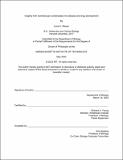| dc.description.abstract | The cell concentrates and compartmentalizes proteins and nucleic acids into diverse phase-separated biomolecular condensates. The study of condensates has yielded myriad fundamental insights into cell biology, ranging from a better understanding of cellular organization, to the exploration of novel mesoscale functions resulting from the emergent properties of these liquid-like compartments. A consideration of the role of condensates in disease and drug development could facilitate similar paradigm shifts, with early evidence suggesting that condensate dysregulation may be a feature of many diseases, and that therapeutics can modulate condensates. In the studies presented in this thesis, we developed and validated a strategy for nominating patient mutations across the spectrum of disease that may cause condensate dysregulation, providing nominated mutations as a resource to the biomedical community for the acceleration of the study of condensates in disease. Further, we tested the hypothesis that small molecule therapeutics can concentrate into condensates, showing that clinically important cancer therapeutics display differential partitioning and that condensate partitioning can affect therapeutic activity (Klein et al., 2020). Lastly, we have expanded upon this condensate partitioning work to show that antisense oligonucleotides (ASOs), nucleic acid-based therapeutics targeting RNA, partition into and modulate certain condensates, and that specific chemical modifications can alter this partitioning behavior. Ultimately, by considering the implications of a condensate model in disease and drug development, this thesis aims to leverage recent insights into biomolecular condensates to facilitate the development of novel disease mechanistic and therapeutic hypotheses. | |
